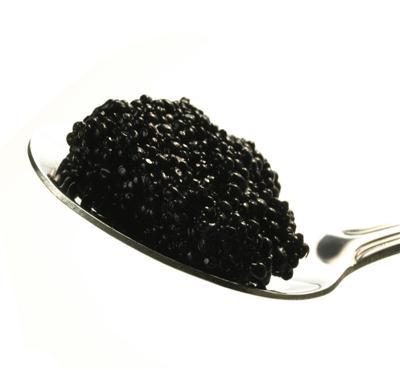'Let's walk down the rue de Seine and look in all the galleries and in the windows of the shops.'
'Sure. We can walk anywhere and we can stop at some new café where we don't know anyone and nobody knows us and have a drink.'
'We can have two drinks.'
'Then we can eat somewhere.'
'No. Don't forget we have to pay the library.'
'We'll come home and eat here and we'll have a lovely meal and drink Beaune from the co-operative you can see right out of the window there with the price of the Beaune on the window. And afterwards we'll read and then go to bed and make love.'
- Ernest Hemingway, A Moveable Feast
Beluga caviar, the most expensive food in the world, is extracted from Almas beluga sturgeon native to the Caspian Sea. One kilogram of these "diamond" eggs, harvested from fish almost one hundred years old, is worth $34,500. The beads must be rolled delicately between the index finger and the thumb, placed onto the tongue, and popped to release the unctuous burst of flavor.
Interestingly, this food of kings first belonged to the poor. Long before the age of blinis and champagne, peasants in medieval Russia spread caviar over buttered black bread and downed it with vodka. Then the imperial aristocracy, the English, the French, discovered "its large grains and sumptuously soft texture," its "subtle but distinctive flavors, [...] buttery or creamy, with notes of hazelnut and almond." Caviar became synonymous with luxury. Caviar days, a lifetime of it.
"Under striped awnings beside the sea grand dukes and gamblers and diplomats and noble courtesans and Balkan czars smoked their slow cigarettes, [...] millionaires tossing away fortunes at roulette." Until a fateful turn turned kings to cab drivers, the night of November 7th, 1917.
Saint Petersburg turned to Leningrad. Storefronts desolate, shelves bare. "Caviar to the general" turned into rye to the people, and in cruel historical irony, the country that exported the precious black pearls could no longer afford to eat them. Survival became the order of the day.
To the cold, it meant a little heat. To the hungry, a little bread. A place to work, a place to sleep. And again the following day. For seventy-four years. "Luxury is the opposite of the naturally necessary," Karl Marx had said. So long as needs were met, the people would not need caviar. In theory.
The great battles of abstract ideas are marked by deprivation and fueled by sacrifice. Caviar and blinis are often the first to go. Some isms last longer than others. Some persist to this day. And whether or not we signed up for them, we must find a way to live through them.
But to survive, paradoxically, is not enough to live. Even in the midst of crisis, especially in the midst of crisis. Art, pleasure, and beauty, like caviar, have a short shelf life. Too short to wait out ideology. Too short to wait for peace.
For seventy-four years, the Soviet regime monopolized all Beluga exports to the wealthy capitalist world. Meanwhile, in the streets of Leningrad, pushcarts sold the proletariat cheap "caviar" on thick slabs of bread. I like to think the luscious pops of salmon and herring roe could be heard, all the way to Moscow.
Evelyn Waugh tells the story of a young Russian aristocrat who fled the revolution and found himself in Paris, alone and stateless, with barely enough money to starve through two more weeks ... until he realized he was in Paris, "and decided to have a luncheon."
"He ate fresh caviare and ortolansan porto and crêpes suzettes; he drank a bottle of vintage claret and a glass of very old fine champagne, and he examined several boxes of cigars before he found one in perfect condition. When he had finished, he asked for his bill. It was 260 francs. He gave the waiter a tip of 26 francs and 4 francs to the man at the door who had taken his hat and kitbag. His taxi had cost 7 francs.
Half a minute later he stood on the kerb with exactly 3 francs in the world. But it had been a magnificent lunch, and he did not regret it."
"Take care of luxuries and the necessities will take care of themselves."
- Dorothy Parker
The Great American Depression was a time when real people were losing real jobs and real homes, but it was also the "Golden Age of Hollywood;" with a twenty-five cent ticket and a five cent bag of popcorn, real people escaped into the fantasy worlds of King Kong, The Wizard of Oz, and Gone with the Wind.
A little later, during World War II, strict rationing left Britons with "scant butter, less flour, and no sugar to spare." Women made potato peel pies and sausages from haricot beans, but still wore red lipstick with patriotic pride.
Oscar Wilde said that "extravagance is the luxury of the poor; penury is the luxury of the rich." In the war-torn Beirut where I was born, penury was an understatement. Sardined in the basement with every other family in the neighborhood, waiting out bomb raids, I remember cold baths in a bucket, stories by gas lamp ... and somehow, the most luxurious crème patissière in the world.
The grocer down the street had developed the recipe. A poor person's version of French pastry cream that could be made with one pot, one utensil, in a basement, in the dark. And make it, the women of our neighborhood did.
The bombs have stopped falling. The caviar days may or may not return. But in the meantime, I have a soft blanket and a good book, fine wine and a scented candle... and I'm polishing off the last of the pastry cream.
This post was originally published here, on the author's blog: Aristotle at Afternoon Tea.

